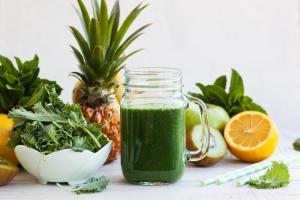Food is medicine, and spirulina is no exception. Humanity has consumed spirulina for centuries (maybe as early as biblical times) and its many health benefits may even replace medications in time.
Nutrient dense food
If nothing else, spirulina is chock full of nutrients the body desperately needs. It’s about 60% protein and contains all essential amino acids, which makes it a complete source of protein. Spirulina is an excellent source of vitamins and minerals including vitamins B1, E and K as well as, iron, manganese, and magnesium. If you’re a vegetarian or vegan, spirulina is a great source of protein and iron for you. Vitamin B1 is essential for metabolizing fats, protein, and sugar. It’s also great for boosting energy, and for eye and brain function.

Helps with allergies
Spirulina is said to have an antihistamine property which may be good news for allergy sufferers. Animal studies show spirulina helps reduce allergic reactions. In a human study, spirulina protected against allergic reactions when taken at 2000mg per day. It’s thought the anti-inflammatory properties help relieve sinus inflammation which causes the allergy symptoms and discomfort.
Helps detox heavy metals
From our water supply to our chocolate, heavy metals are everywhere. Arsenic, cadmium, chromium, lead, and mercury are some of the most toxic metals and can cause serious health concerns when they accumulate in the body. Unfortunately, our bodies can’t remove heavy metals on their own, but spirulina may be able to remove them. Spirulina is a great chelating agent, meaning its molecules can form bonds to metal ions, and removes them from the body. Spirulina also removes cadmium and lead, among others.
Prevents cancer
Oxidative stress can cause DNA and cellular damage which can lead to cancer and other diseases. Spirulina is an excellent source of antioxidants necessary for fending off oxidative stress as well as counteracting inflammation. According to University of Maryland Medical Center, spirulina increases cell production to improve the immune system and help ward off infection and diseases such as cancer. In many studies, spirulina indicates it may be a cancer preventative. One study found spirulina had anti-proliferative effects on cancer cells, meaning the cells did not spread.
Improves gut health
Eighty percent of our immune system resides in our digestive tract. When the gut isn’t healthy the rest of the body struggles. With our modern diets of sugar and grains, as well as overuse of antibiotics, many of us struggle to maintain healthy gut flora and may suffer from candida and bacterial overgrowth. Numerous studies show spirulina can actually improve gut flora by helping good bacteria grow, which crowds out bad bacteria and candida.
May improve your ability to fall asleep
Spirulina contains L-tryptophan, an amino acid that helps the body to produce melatonin, a hormone necessary for sleep. Some folks take melatonin supplements to help with sleep, but it’s not a long-term fix. If you take supplemental melatonin your body may slow down the natural production of melatonin, which means sleep problems will worsen in the long run. However, spirulina supplements support your body’s natural melatonin production, which is ideal for long-term quality sleep.

Improves aerobic performance
Exercise is excellent for the body but can also cause damage, especially during intense exercise. Spirulina supplementation can improve endurance and reduce muscular and skeletal damage that occurs with moderate to intense exercise. Studies also show spirulina helps the body utilize fat for energy (instead of sugar) and reduces oxidative damage after exercise.
Lowers risk of heart disease
Cardiovascular disease is a huge health concern in the U.S. Studies show spirulina can reduce LDL (bad cholesterol) and triglycerides, while raising HDL (good cholesterol). That means spirulina may help reduce or eliminate heart disease when taken as a supplement. Some studies show a dose of 2 grams per day is sufficient to see improvements while others found higher doses (up to 8 grams a day) were necessary.
Japanese researchers found the phycocyanin that gives spirulina its blue/green color can also lower blood pressure, another marker for cardiovascular disease.
Improves cognitive function
Spirulina may be able to boost your brain power! Studies show spirulina reduces oxidative damage to cells which improves memory. One study also found spirulina may protect against cognitive degenerative diseases such as Alzheimer’s. Spirulina may even help kids with ADHD increase productivity and improve their ability to focus. It may be the antioxidant in spirulina that supports cognitive function.
May help balance blood sugars
Studies show spirulina may help balance blood sugar levels. In this study, rats with induced hyperglycemia fed spirulina showed a significant reduction in metabolic abnormalities. Another study from the University of Baroda in India found spirulina helps keep blood glucose levels healthy over a long period, which means it may be effective as a long-term glucose regulator.

How to consume spirulina
There’s no question spirulina health benefits are worth checking out, but how? Spirulina is most often found in a powder or tablet form. Tablets can be taken just as you take any other supplement. Spirulina powder can be used in more creative ways.
- Add a tablespoon to a green smoothie
- Mix it into your favorite brownies or brownie bites like these
- Superfood banana bread
- Supercharged tea
- Spirulina vegan ice cream
Basically, you can add it to whatever you want to. Just be aware it will color your food a deep blue/green.
A word of caution on spirulina
What makes spirulina such a great tool for heavy metal detox (it attaches to heavy metal ions) also makes it susceptible to radiation and heavy metal contamination. Always check your spirulina is high quality and comes from a reputable company like Organic Burst or Mountain Rose Herbs.
Spirulina: A great addition to a healthy lifestyle
We all know superfoods are only as good as the regular diet and lifestyle they supplement. Adding spirulina to your real food diet may offer many health benefits beyond basic nutritional support. The way you consume spirulina is up to you and it can be fun to experiment with!
